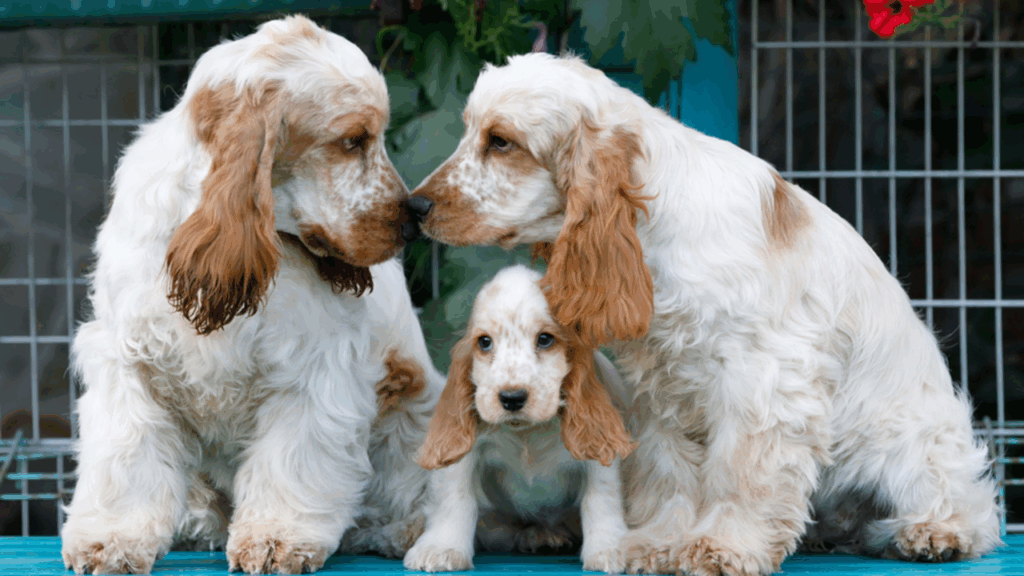The Cocker Spaniel, with its soulful eyes, long ears, and cheerful personality, has long been a favorite among dog lovers around the world. Known for their affectionate nature and beautiful coats, Cocker Spaniels are more than just pretty faces—they are also agile, intelligent, and deeply loyal companions. There are two main varieties of Cocker Spaniels: the English Cocker Spaniel and the American Cocker Spaniel. Though similar, they have key differences in appearance and temperament, with the English Cocker often being more active and slightly larger.
This article focuses primarily on the English Cocker Spaniel, the older of the two breeds, though many characteristics apply broadly to both.
Origins and History
The Cocker Spaniel’s roots go back to 14th-century Spain and England, where spaniels were bred as hunting dogs, particularly to flush game birds from underbrush. The name “Cocker” comes from the woodcock, a game bird the breed was especially good at hunting.
Originally, all spaniels were categorized by function rather than breed. Eventually, the English Cocker Spaniel was distinguished from other spaniels, and in the 19th century, the breed standard was solidified. The American Cocker Spaniel was developed in the United States, primarily for show purposes, and recognized as a distinct breed in 1946.
Appearance
The English Cocker Spaniel is a medium-sized dog, standing 15 to 17 inches tall and weighing 26 to 34 pounds. It has a compact, athletic build, slightly longer than tall, with a strong, balanced structure suited to both sport and play.
Their most iconic features include:
- Long, pendulous ears covered in silky hair
- Soft, expressive eyes that radiate warmth and intelligence
- A gently waving coat that can come in a wide variety of colors: black, liver, red, golden, roan, and even multi-color combinations
Compared to the American Cocker, the English variety has a longer head, less dome-shaped skull, and generally a more robust, workmanlike appearance.
Temperament and Personality
Cocker Spaniels are often described as merry, gentle, and affectionate. They are known for their “happy wag”, a constantly wagging tail that reflects their naturally upbeat attitude.
Loving and loyal, Cockers form strong bonds with their families. They are excellent with children and usually get along well with other pets. These dogs thrive on companionship and often suffer from separation anxiety if left alone too long.
Because of their sensitive nature, they are best suited to gentle, consistent training methods. Harsh discipline can make them shy or anxious.
Exercise and Activity Needs
Although they may look like lapdogs, English Cocker Spaniels are active sporting dogs that need daily physical activity. A brisk walk, a game of fetch, or a romp at the dog park are great ways to keep them happy and fit.
They also love activities that tap into their natural instincts, such as:
- Tracking and scent work
- Agility
- Field trials
- Obedience and rally sports
Without enough stimulation, Cockers can become bored and may resort to barking, digging, or chewing.
Trainability and Intelligence
Cocker Spaniels are smart and eager to please, which makes them very trainable. They respond best to positive reinforcement with treats, praise, and play. Early socialization and obedience training are essential for a well-mannered dog.
Thanks to their adaptability and willingness to learn, Cockers often excel in therapy work and service dog roles as well.
Grooming and Care
Their beautiful coat is one of the breed’s standout features, but it does require regular grooming. To keep them looking their best:
- Brush several times per week to prevent tangles and mats
- Trim the hair on their feet, ears, and underside every few weeks
- Clean their ears weekly, as their long ears can trap moisture and lead to infections
Many owners choose to take their Cockers to a professional groomer every 4–6 weeks.
Health and Lifespan
The English Cocker Spaniel is generally a healthy breed with a lifespan of 12 to 14 years. However, they can be prone to certain conditions, including:
- Ear infections
- Progressive retinal atrophy (PRA)
- Hip dysplasia
- Hypothyroidism
- Allergies and skin conditions
Reputable breeders will screen for genetic diseases, so always choose a responsible source if purchasing a puppy.
Is the Cocker Spaniel Right for You?
The English Cocker Spaniel is ideal for families, singles, and seniors alike—anyone who is looking for a loyal, loving, and playful companion. They do best in homes where they receive plenty of attention, exercise, and affection.If you’re looking for a dog that’s easy to train, good with kids, and full of personality, the Cocker Spaniel may be your perfect match. With the right care, these cheerful dogs will bring joy, devotion, and wagging tails into your life for many years to come.

Andy Parker is a dog lover, writer, and senior editor at BarkPicks. With years of experience covering canine health, training, and gear, he helps pet parents make smarter choices for happier, healthier dogs. Andy shares his home (and heart) with two rescue pups, Charlie and Mia.



